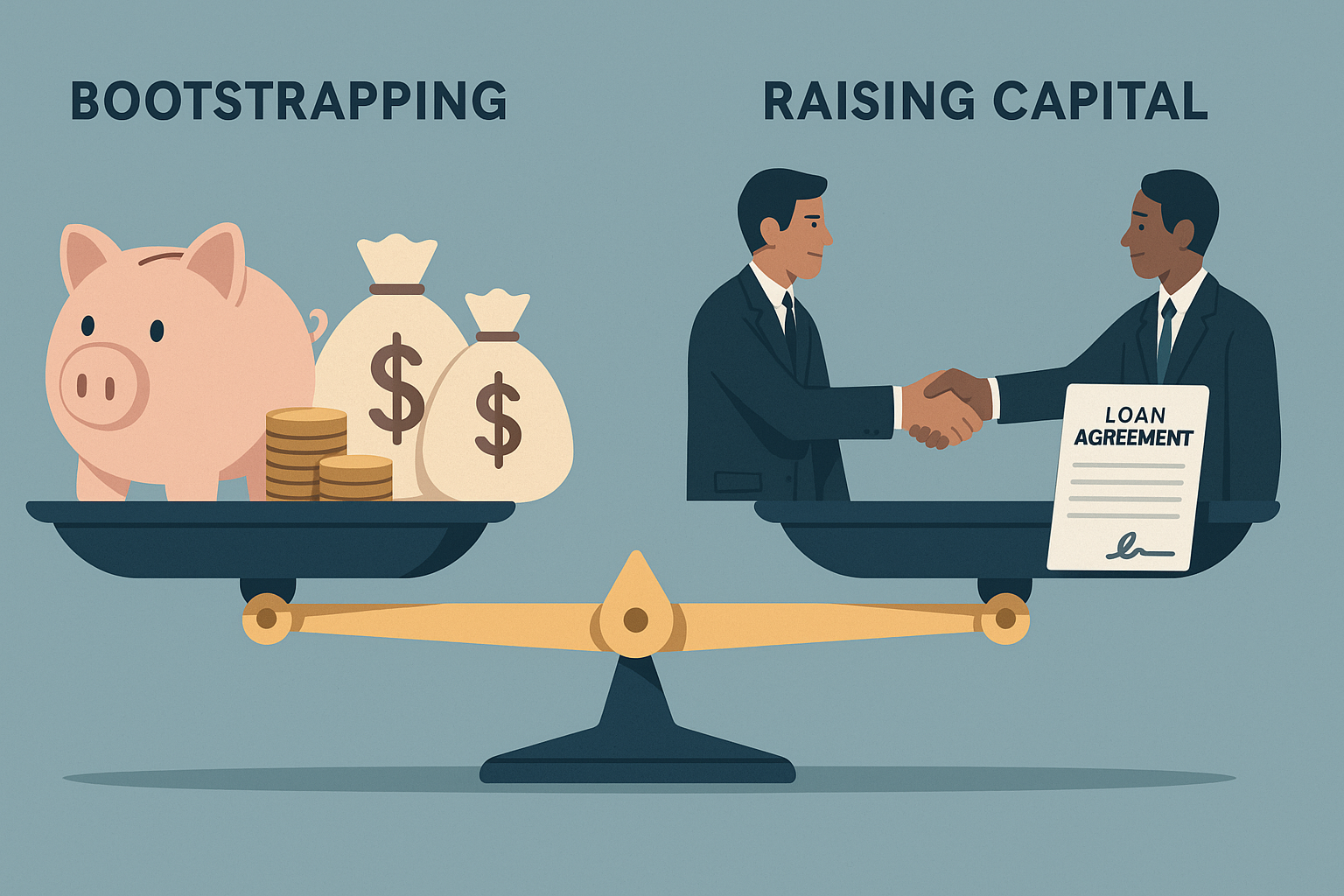1 (800) 584-0324
Every founder faces the same question at some point: Do I keep growing with my own resources, or should I raise outside funding? Choosing between bootstrapping vs raising capital isn’t just about money—it’s about control, growth speed, and long-term vision.
This guide breaks down both approaches, highlighting the trade-offs so you can make the best decision for your business.
What Is Bootstrapping?
Bootstrapping means growing your company with internal cash flow, personal savings, or reinvested profits—without outside investors or significant loans.
- Common in service businesses, consultancies, and niche product startups.
- Prioritizes profitability and cash discipline early.
- Founders retain full ownership and decision-making power.
What Is Raising Capital?
Raising capital involves securing outside financing to accelerate growth. This could mean:
- Equity funding: Selling shares to angel investors, venture capital firms, or crowdfunding investors.
- Debt funding: Taking out loans, lines of credit, or alternative lending (SBA, BDC, asset-based loans).
- Hybrid models: Non-dilutive structures like Revenue-Based Financing.
Raising capital can fuel faster expansion, but it also comes with obligations—repayment, dilution, or governance oversight.
Bootstrapping vs Raising Capital: Side-by-Side
| Factor | Bootstrapping | Raising Capital |
| Ownership | 100% founder-owned | Diluted if equity; lender covenants if debt |
| Control | Full autonomy | Investors/lenders may influence decisions |
| Speed of Growth | Slower, organic | Faster, fueled by external funding |
| Risk | Lower debt/external pressure | Higher repayment or investor expectations |
| Cash Flow Pressure | Must stay cash-positive early | Funding cushions early cash flow needs |
| Brand Signal | Bootstrapped = scrappy, lean | Funded = validated, attractive to talent |
Pros of Bootstrapping
✅ Full control, no outside interference
✅ All profits remain with founders
✅ Forces financial discipline and efficiency
✅ Lower risk of overextending prematurely
Cons of Bootstrapping
❌ Slower growth trajectory
❌ Limited ability to seize big opportunities
❌ Personal financial strain if self-funding
❌ Harder to compete in capital-intensive industries
Pros of Raising Capital
✅ Accelerates scaling (marketing, hiring, product)
✅ Access to investor expertise and networks
✅ Ability to pursue bigger opportunities sooner
✅ Greater resilience during downturns with cash reserves
Cons of Raising Capital
❌ Dilution of ownership (equity)
❌ Debt obligations and covenants (loans)
❌ Investor pressure for rapid growth/exit
❌ Time-intensive fundraising process
When Bootstrapping Makes Sense
- Service-based businesses with low upfront costs
- Startups aiming for sustainable, steady growth
- Founders who want full control and independence
- Companies in industries that reward lean, profitable scaling
When Raising Capital Makes Sense
- Businesses with large market opportunities needing speed
- Capital-intensive industries (manufacturing, biotech, hardware)
- Startups where being first-to-market is critical
- Founders comfortable with investor oversight and dilution
Hybrid Paths: The Middle Ground
Many businesses combine both strategies:
- Bootstrap initially to prove product-market fit.
- Raise capital later (through equity or loans) to scale faster once validated.
- Use non-dilutive financing tools like Working Capital Financing or Prêt garanti par des actifs to balance control with growth.
U.S. vs Canada: Funding Context
- U.S.: Wide access to angel, VC, and SBA loan programs. Bootstrapped startups may raise later once metrics are strong.
Canada: BDC and CSBFP loans give early-stage SMEs more debt options. Equity markets are smaller, making bootstrapping or debt financing more common initially.
Still unsure about bootstrapping vs raising capital? Agile Solutions helps founders in the U.S. and Canada analyze funding strategies, model dilution vs debt, and connect with lenders or investors who align with your goals.
👉 Book a consultation today at agilesolutions.global or email us at info@agilesolutions.global
#Bootstrapping #RaisingCapital #StartupFunding #BusinessLoans #EquityFinancing #AngelInvestors #VentureCapital #GrowthStrategy



